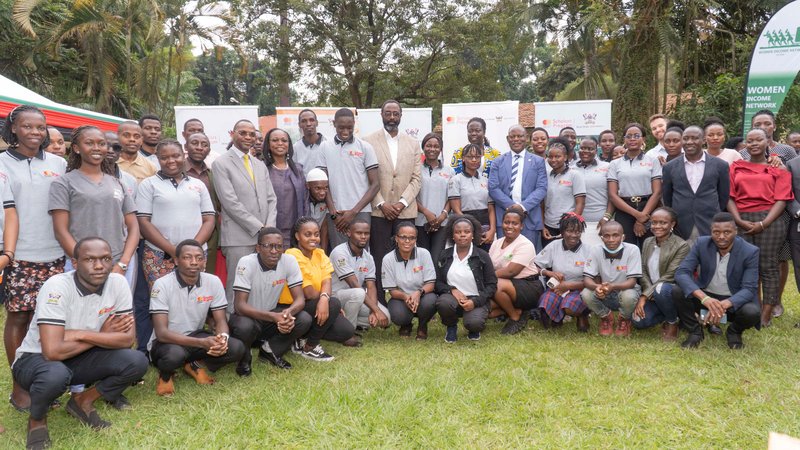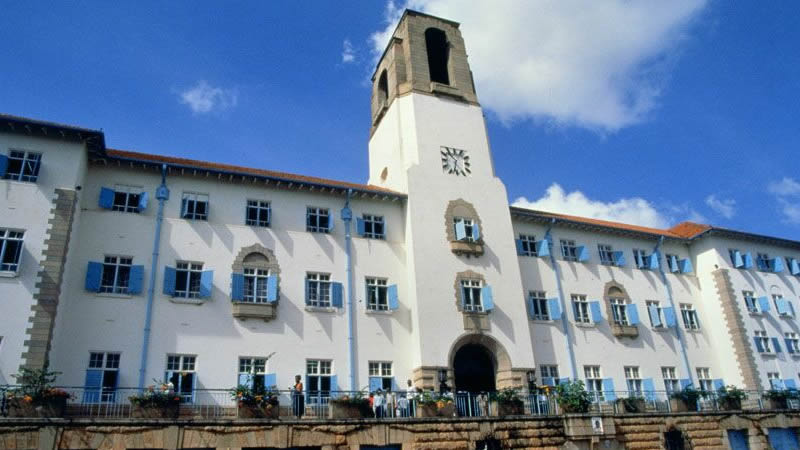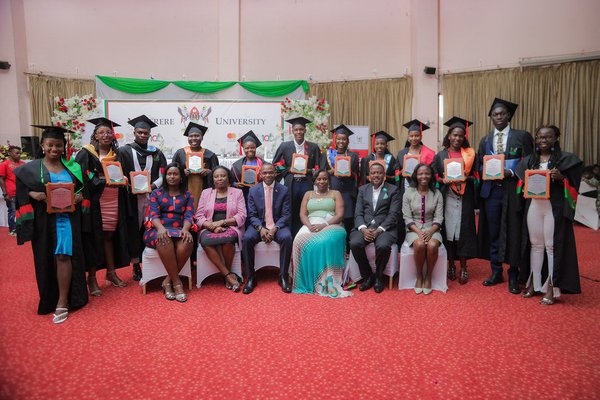The Mastercard Foundation Scholars Programme is committed to enabling 1,000 deserving but economically disadvantaged young people to access higher education and leadership training at Makerere University. The programme is proud to have recruited 1,032 young people to study at Makerere University in its first ten-year phase. It has also just celebrated its 10th anniversary with the theme “A decade of Transformative Impact and Learning”, a milestone Makerere University has been part of for the last nine years and which is worth celebrating alongside the centenary celebrations of the university.

Some of the Mastercard Foundation Scholars with the Vice-Chancellor, Prof. Barnabas Nawangwe
The programme at Makerere University boasts of a number of achievements.
It has offered scholarships to 1,032 young people to attain quality higher education, of which 75% are females. It has also graduated 789 alumni, as of February 2023, which is 76% of the total enrolment (634 females and 155 males). Of those who have graduated, up to 5% have done so with First Class degrees; 65% with Second Class Honors-Upper; 25% Second Class Honors-Lower; and 5% Pass degrees.
These young people have joined the workforce of Uganda. 35% of the alumni transitioned into formal employment while 20% took up entrepreneurship. About 3% of the alumni have progressed into further education and 27% are engaged in multiple transition pathways, where they are contributing to the transformation of their communities.
As it plans for the next decade and looks to contribute to societal development, the program continues to recognise that to enable young people across Africa to succeed, there is a need to address systemic barriers in higher education (financial, gender-related constraints, ICT skills, and technologies); to strengthen the capacity of institutions that serve young people; and to support innovative solutions across critical sectors.
It is on this premise that three initiatives have been laid out. The first initiative is to expand the programme to reach out to 100,000 young men and women. To date, 42,000 scholarships have been extended in Africa, and 58,000 scholarships shall be extended by 2030. Phase II of the programme at Makerere University has seen the institution submit a proposal for at least 2,000 scholarships over the next 10 years. There are proposed key considerations in this phase. First, there shall be consideration of inclusivity, including students living with disabilities, students from refugee communities, and those completing A-level education in vulnerable and economically disadvantaged locations. Second, there shall be a component of scholarships for graduate studies. Third, there shall be a component of research to foster institutional transformations.
The second initiative will entail the Research Collaborative – where partner institutions (staff and graduate students) shall engage in research in thematic areas, to influence institutional transformation and inform national development. Some of the thematic areas include health, food security and climate change. This fits in well with the agenda for Makerere University as a research-led university.
The third initiative will be on online learning, focusing on democratizing access to education through e-learning. On this front, Makerere University launched a Mastercard Foundation Scholars Programme e-learning initiative in September 2022. It is an 18-month project that will revitalize the e-learning infrastructure at the university. Already, Arizona State University and United States International University-Africa have trained 15 faculty and staff in instructional design and online pedagogy. Over 2,560 courses will be developed online through the e-learning initiative. These courses will be academic and accessible to youth with disabilities.
Article compiled by the Communications Unit of Mastercard Foundation Scholars Program at Makerere University
Related News
Return to the News
![]() Please join hands with the Makerere University Endowment Fund as it works towards attracting & retaining the best faculty, providing scholarships, and investing in cutting-edge research and technology.
Please join hands with the Makerere University Endowment Fund as it works towards attracting & retaining the best faculty, providing scholarships, and investing in cutting-edge research and technology.

